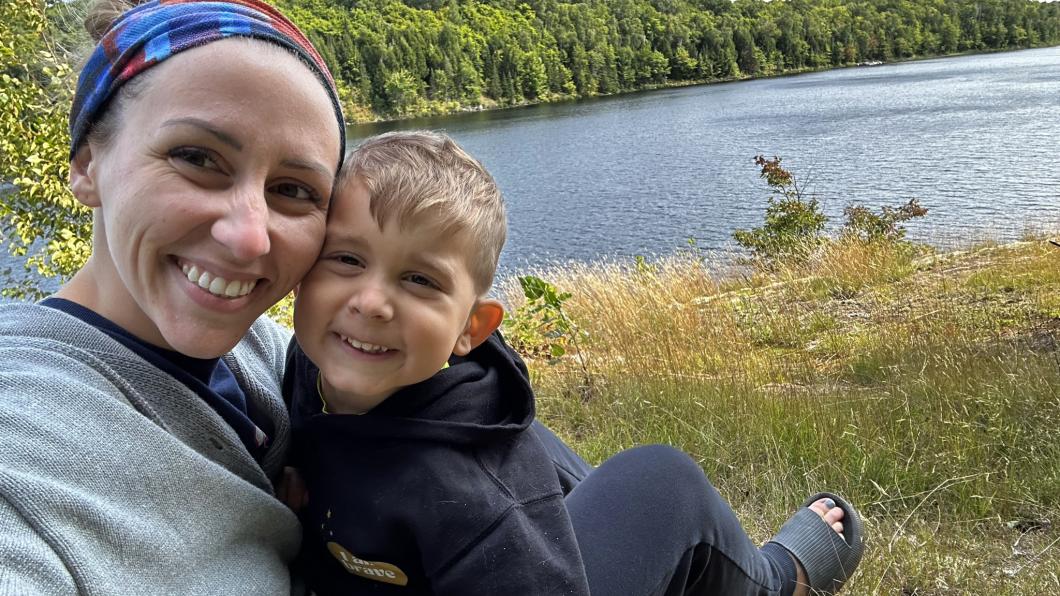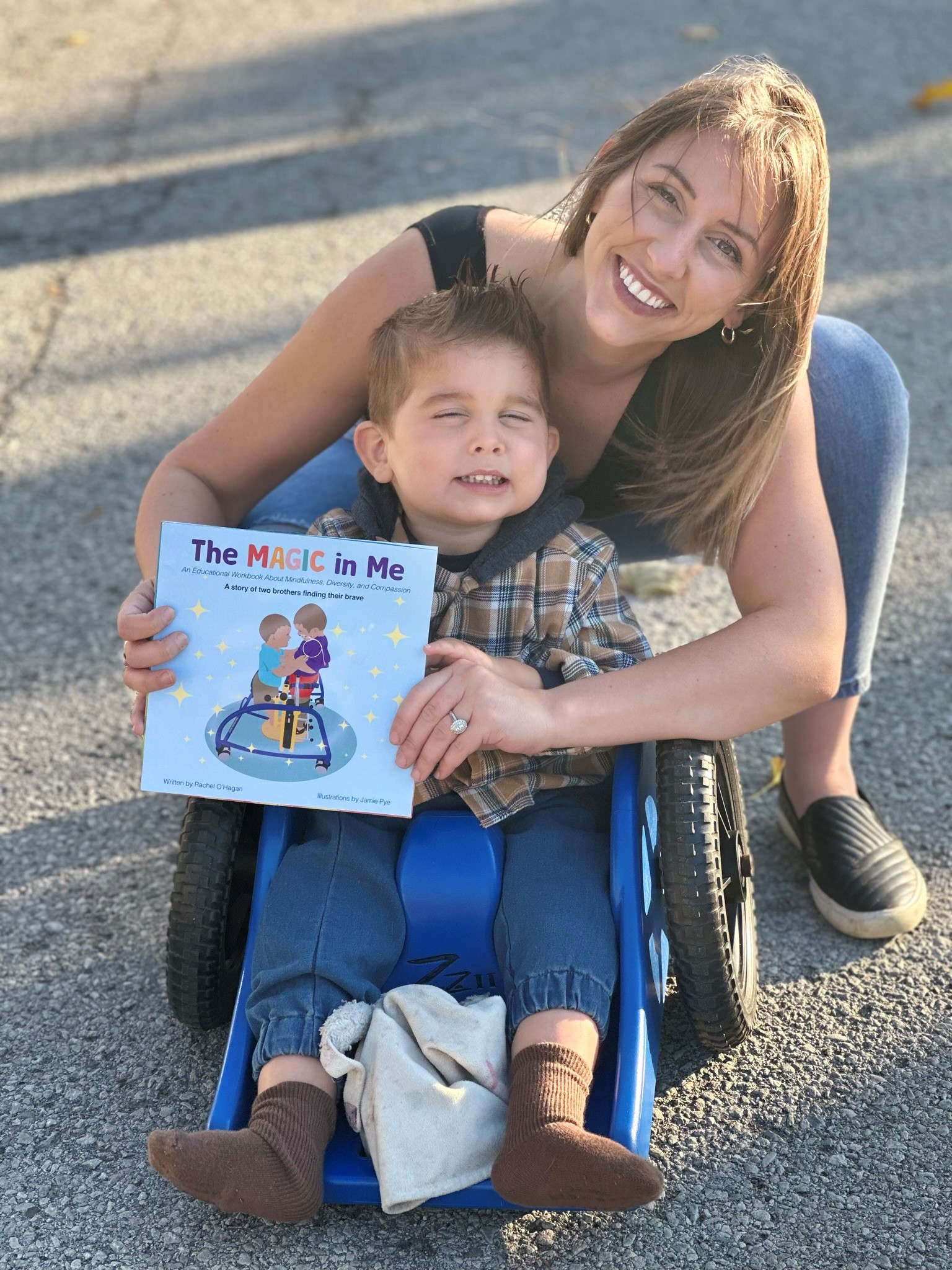
Caring for a child with a rare disease starts with caring for yourself
Rachel O'Hagan and son Beau
By Louise Kinross
Rachel O'Hagan is a teacher. So when her baby son Beau began having hand tremors, then losing strength, she remembered a former student who had a condition called spinal muscular atrophy (SMA). "I knew something neurological was happening, but doctors told me Beau was a big, lazy boy and I was doing too much for him, and that's why he was losing skills."
For months, Rachel took Beau to different doctors, asking for a test for SMA, which is a rare genetic condition that causes muscles to weaken and waste away. "For nine months I was fighting for this blood test, and when we finally got it, we had the answer within two days: Beau had SMA. By the time he was diagnosed at 17 months, he couldn't lift his arms up, he couldn't sit on his own, and his legs were like jello."
Today Beau is four. At age two he was treated with a breakthrough gene therapy called Zolgensma. "It can't reverse the damage that was done, but it can stop the progression," Rachel says. Beau uses a wheelchair, just started standing, and is receiving rehab at Holland Bloorview to continue building his strength.
Rachel hopes to empower other parents to speak up to get their needs met.
"I struggled to use my voice growing up," Rachel says. "Now I was in a situation where I had to advocate for Beau everywhere—whether for his accessibility needs or in the health system or at school. I was trying to control everything, and when Beau had a medical emergency I took it personally, like I had failed. When I spoke up to doctors and they ignored me, I felt helpless and I started having panic attacks."
Since then Rachel has made significant changes in her life to protect her emotional and physical health. "We need care and support, which then extends to our children," she says.
It starts early in the morning when Rachel gets up to do her own routine before her family wakes. "I have to get my basic needs met in order to care for my family," she says. "When they wake up, it's all consuming, and I lose me." Her day starts with eating and drinking, some yoga or meditation, and writing. "I call it my chaotic mind. I word vomit all my thoughts and feelings in a journal so I don't carry them throughout the day. That includes the good, the bad, and the ugly. Things I'd never say out loud, but I need a space to release them, so they leave my body."
When Beau was first diagnosed, Rachel struggled to support those around her. "I had to send uplifting messages to everyone who was grieving, and I didn't have anyone to do that for me."
She began an Instagram page called @bravelikebeau and it's turned into her own community of support. "I'd record myself sharing our story and say I needed words of encouragement," she says. "Many people responded and continue to this day to reach out and be there. We've connected with people all over the world, some old friends, but mostly all new."
When it looked like the family would have to pay for gene therapy for Beau, a GoFundMe page shared on their Instagram page raised $85,000 in four days. Beau was subsequently treated through a compassionate assistance program, but the money paid for equipment and private therapy during the pandemic shutdown.
While Beau was in hospital for months, Rachel's therapist suggested she take a course to be trained as a mindful self-compassion teacher. "I realized I had so much compassion for others, but not for myself. The first step involves directing loving awareness [to your] challenging thoughts, emotions, and sensations. I realized how much easier it was to accept my son's diagnosis when I accepted myself."
The training was online and pre-recorded, so she could fit it into her schedule. "I was able to receive a scholarship, so I didn't have to pay for it," she says. "This was a community I met virtually each week, from around the world. I could openly share what I was feeling and not feel any shame because they were strangers. I said all of these dark thoughts that I would normally hide, and people met me with compassion and gave me a community to lean on."
Rachel suggests other parents develop their own self-care practices. For example, "My family spends most of the day outside, connecting with nature, hiking, gardening and doing physiotherapy and other exercise outdoors. It's a sensory experience that promotes mindfulness, rids us of all of life's distractions, and allows us to see the beauty in the right now. Sometimes my mind can take me to fearful places," she says, but nature provides a respite.
Beau initially came to Holland Bloorview as an inpatient, but being away from home in Beamsville, Ont. was hard on his family.
"My youngest, Rory, was at home and greatly struggling with missing his brother and not understanding why he was away," Rachel says. When she broached the topic with Beau's medical team, they agreed that moving to day patient status made sense. "I voiced my own personal needs to feel more comfortable, and my needs were met. Parents need to remember that their needs matter while they're staying in hospital, and it's okay to say 'I need something' as a caregiver. I want to teach caregivers how wildly deserving they are."
She now drives two hours to the hospital and then home each day to keep the family unit intact.
Rachel notes that if Beau had received his gene therapy when she first began asking doctors for the SMA test, he would be walking now.
"I could sit and have that anger inside of me and stew for the rest of my life, but I know that would be a disservice to me," she says. "The situation happened. There's nothing I can do about it. I need to use that anger to fuel my energy to make change and get loud for other families. This is our path, and we can make change for the people who walk after us, just like the people who initially fought for treatment and lost their lives. We all have a place on this journey."
Rachel has written a children's book called The Magic In Me that tells the story of Beau and his brother Rory, while sharing information about SMA, medical equipment, inclusion, and self-compassion. It promotes bravery and acceptance of self and others. Like this story? Sign up for our monthly BLOOM e-letter. You'll get family stories and expert advice on raising children with disabilities; interviews with activists, clinicians and researchers; and disability news.
